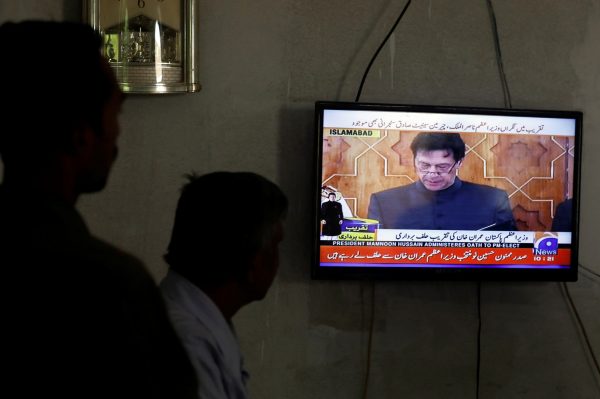To be sure, President Ashraf Ghani in Kabul and Prime Minister Narendra Modi in Delhi welcomed the election of Imran Khan and expressed their hopes for new beginnings. But both Ghani and Modi are acutely conscious that civilian leaders have little influence over the conduct of Pakistan’s foreign policy.
This was not always the case. In the 1990s, civilian leaders like Benazir Bhutto and Nawaz Sharif had some influence over the direction and content of Pakistan’s international relations. But over the last two decades the army has largely cut out elected leaders from the making of foreign policy. These two decades have also seen a decline in the influence of Pakistan’s diplomatic corps, which once loomed large over the nation’s international relations.
Both Asif Ali Zardari, who led the Pakistan Peoples Party to victory in 2008 after the assassination of his wife Benazir Bhutto, and Nawaz Sharif who swept back to power in 2013, attempted to wrest back some influence over Pakistan’s diplomacy. Of particular concern was regaining some control over Pakistan’s policies towards Afghanistan, India and the United States. These efforts were in turn linked to concerns about the Pakistan army’s use of jihadi groups as an instrument of foreign policy and to the question of rebalancing civil–military relations in favour of the former.
In his first interaction with the press in Islamabad, Khan’s Foreign Minister Qureshi claimed that Pakistan’s foreign policy will be made in the foreign office. While rejecting popular ‘pre-conceived notions’ about how foreign policy is made in Pakistan, Qureshi promised to ‘engage with all the institutions for the betterment of the country.’ He pointed out that ‘feedback is sought from national security institutions’ in the conduct of foreign policy across the world.
Decision-makers in Kabul and Delhi would rather wait and watch than accept Qureshi’s claim on face value. But leaders in Afghanistan and India have no practical alternative other than to make a fresh effort at normalising relations with Pakistan, even if scepticism about the possibilities for change in the conduct of Pakistan’s foreign policy might be in order.
It is also likely that Ghani and Modi are willing to test out the chance for a fresh start with Pakistan with Imran at the helm. While structural constraints imposed on elected leaders by the military in Pakistan are real, Ghani and Modi know that it would be unwise to completely disregard the political agency of Khan.
While some analysts have dismissed Imran Khan as the new public relations manager of the Pakistan army, the new Prime Minister of Pakistan has been an immensely popular figure in the country for more than three decades. He has mobilised masses of support during his electoral campaigns and has created new hope amid the entrenched cynicism that characterises much of Pakistani politics.
Further, even assuming that its dominance is real and hard to change, the army may yet need a credible figure to bring a measure of coherence to Pakistan’s polity, improve economic performance and end the relative weakening of Pakistan’s regional and international standings. If Imran’s tenure does turn out to involve a partnership with the armed forces, it is still possible to imagine the prospects for a restructuring of Islamabad’s regional policies.
Both Imran Khan and Qureshi have signalled their intent to improve relations with Afghanistan and India. For nearly four decades, developments in Afghanistan have been the main force shaping Pakistan’s internal and external environment. The extended conflict in Afghanistan may have recently entered a decisive moment amid the United States’ growing exhaustion and the intensified quest for a political settlement between the government in Kabul and the Taliban.
There is no escaping the fact that Pakistan, which provides sanctuary for the Taliban, is in the best position to nudge the militant group towards a settlement. And Imran Khan, with his record of empathy for the Taliban, could play a critical role in this process.
The difficulty for Khan would be in determining the terms of settlement that are favourable for all parties. A positive role in a potential Afghan end-game could bring huge political rewards for Pakistan. A miscalculation on this front, on the other hand, could prove disastrous for Pakistan’s relations with the United States and its allies.
The room for manoeuvre on the India front is more limited. Both sides have well-established positions on requisites for advancing a peace process, which have produced a political stalemate. Imran Khan has in fact repeated some of those Pakistani positions, especially the centrality of the Kashmir question.
In his letter to Imran, Modi reportedly expressed India’s readiness to pursue ‘meaningful and constructive engagement’ in a ‘violence-free’ atmosphere. In between these different emphases there is room to construct a pause in the conflict and adopt a range of mutual confidence-building measures. India and Pakistan have done this before and can do it again.
If productive engagement can be sustained, it could generate a momentum of its own. For now, cautious optimism is likely to be the main sentiment expressed by those hanging onto prospects of major change in Pakistan’s key regional relationships.
C Raja Mohan is Director, Institute of South Asian Studies, National University of Singapore.

